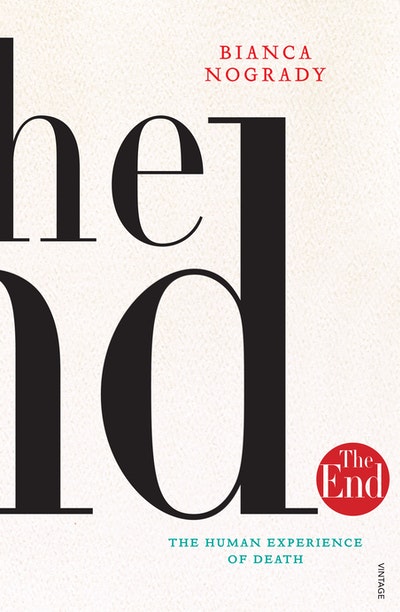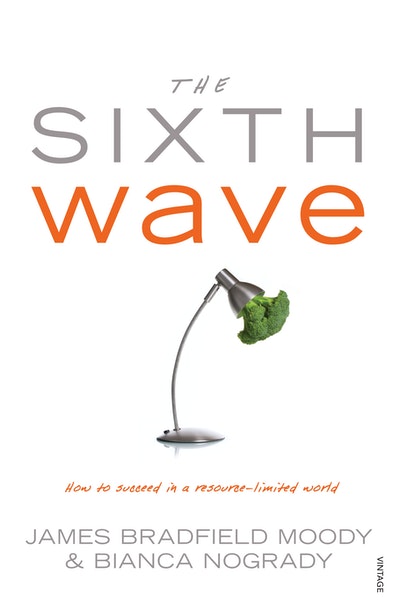- Published: 1 May 2013
- ISBN: 9781742752051
- Imprint: Vintage Australia
- Format: Trade Paperback
- Pages: 272
- RRP: $35.00
The End
The Human Experience Of Death
- Published: 1 May 2013
- ISBN: 9781742752051
- Imprint: Vintage Australia
- Format: Trade Paperback
- Pages: 272
- RRP: $35.00
The End: the human experience of death is enlightening in the best possible way, about something that is such a fundamental part of life, most of us choose to avoid dwelling on it. An accomplished science journalist, Bianca Nogrady has covered every base in her investigation of the phenomena of death - philosophy, medicine, science, ethics and culture.
Helen Hayward, The Sydney Morning Herald
A treatise for anyone who has contemplated their own mortality - which must be everyone who has dawn breath.
Martin Stevenson, The Examiner
Although everyone dies, no one alive fully knows what the experience is like. Nogrady, a journalist. describes what science says about the goings-on in the mind and body at death and investigates phenomena that lack good explanations, such as seeing a light at the end of the tunnel. She also examines the politics of death such as the debate over euthenasia, as well as personal accounts of people who have had near-death experiences or have watched a loved one die. Nogrady's book offers a comprehensive reflection on everything we know - and what we can only guess - about the end.
Annie Sneed, Scientific American
Nogrady relates heart-warming stories of patients dying at home in bed, family crowded around telling stories, laughing and crying together - the way we all hope we'll go. She highlights recent changes in thinking about hospital intensive-care wards and considers the "good death" movement that aims to design the best possible circumstances for our passing: familiar surroundings, loved ones, even a sense of expectation, almost a countdown, as we control or anticipate death's approach to the extent medicine allows.
Drew Turney, The Australian
Through engaging, heartfelt anecdotes, Australian journalist Nogrady (The Sixth Wave) researched what it might be like to die—from those who have experienced it and those who have observed the experience intimately, such as caretakers. Moved by the “good” death of her grandmother Nan, comfortable and surrounded by family at her nursing home, Nogrady approached experts for explanations of the why and how of death: along the way she lists what illnesses are the top killers around the world and sifts through the contrasting definitions of death (does it occur when the heart fails, the breathing ceases, or the brain stops functioning?). From the science of the dying body Nogrady moves to “experiencing death,” such as near-death journeys, and while her evidence is more like hearsay, it is still valuable and fascinating. Throughout, Nogrady discusses what it’s like to help a dying person find a safe place and suitable time, and what observers should expect (skin sensitivity, dementia, letting go). She has produced a brave, clear-eyed work and is not afraid to join science with spirituality.
Publishers Weekly
For doctors and patients alike, this is a thought-provoking read that is sure to prove a conversation-starter about the unavoidable end.
Megan Howe, Australian Doctor
Perhaps surprisingly – and despite the subject matter – Nogrady offers an account which is seldom tragic, often amusing and endlessly fascinating: from Pacific Islanders killed by falling coconuts to those condemned to a lengthy departure by the unwanted intervention of dedicated medical workers. She reports on the successes (and failures) of palliative care and she recounts the remarkable story of Oscar, a feline harbinger of death, whose ability to discern the process of dying was recorded in the New England Journal of Medicine. Given the universal nature of the subject, anyone now alive could benefit from reading this book. But it constitutes a virtual treasure trove of knowledge and wisdom for those of us who are regularly called upon to counsel and comfort the grief-stricken and bereft. We learn why death is not always the worst thing that could happen and why bedside conversations should always be positive.
Larry Timberlake, The Celebrants Association
Nogrady has told a compelling story, taking the reader through a catalogue of dying and death, telling us the how and why. Her approach is scientific and thorough, and she discusses and explains available options, as well as religion and faith. She uses her personal experience of her grandmother’s death, and many interesting examples of other people’s experiences of death. Nogrady consults physicians and scientists in several countries, plus hospice workers, nurses and voluntary carers. She investigates world practice, reveals death in all its complications, discloses religious and spiritual beliefs, and its legal ramifications. She shows no bias and her accurate telling of assisted suicide available in Switzerland and the USA, Belgium and Luxembourg, is balanced by sections on palliative care practices and the use of sedation prior to death.
Belinda Ramsey, Dying with Dignity Victoria
The End covers the biological, spiritual and emotional aspects of death beautifully. The End was writen with a very strong sense of dignity and almost beauty.
Drew Turney, Girls and Corpses




